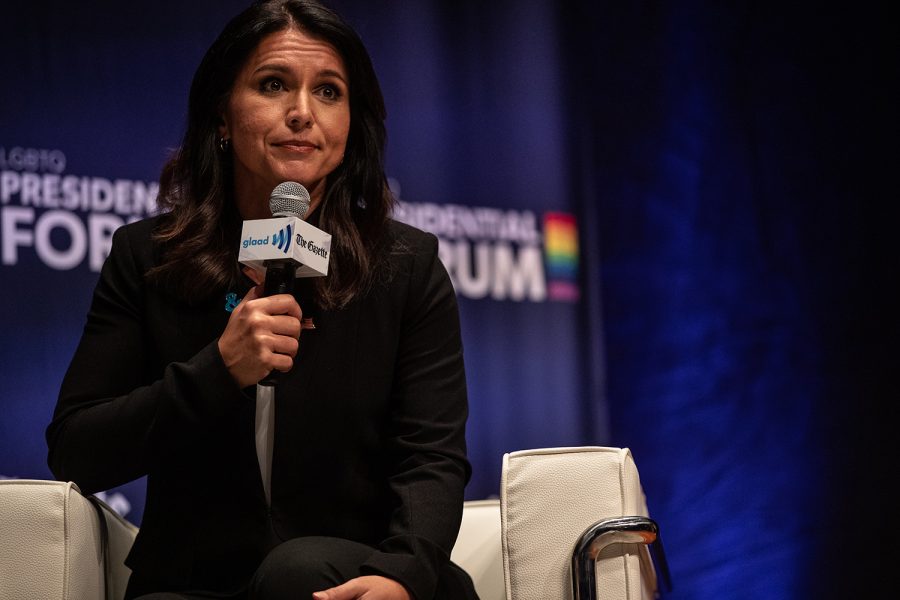Opinion: 2020 presidential hopefuls need to focus more on education policy
With so many campaign events happening in college towns such as Iowa City, more time should be given to higher education.
Representative Tulsi Gabbard, D-HI, pauses during the L.G.B.T.Q. Presidential Forum at the Sinclair Auditorium in Cedar Rapids on Friday, September 20, 2019. Each candidate that participated was gave a three minute introduction, and answered questions for a total of ten minutes.
October 13, 2019
Iowa isn’t the only destination for presidential candidates. Those bidding for the White House have crowded college campuses across the country, showing off their politics, policies, and promises across countless speeches and campaign events. Each person offers their own specific views.
Still, in the thick of campaigns and conversation, each presidential candidate fails to shed light on a subject that matters to their prospective student voters: higher education. This is not to say candidates avoid education entirely, but issues such as health care and gun violence seem to normally take precedence. While several candidates have an education policy buried somewhere on their website, the issue needs to be more prevalent, especially at college-centered events.
Of course, not all candidates are at equal fault. Sens. Bernie Sanders, I-Vt., and Elizabeth Warren, D-Mass., have made education policy key parts of their platforms with proposals that would basically eliminate student-loan debt. But for the rest of the field, one has to do some deep digging to find a stance on the issue.
The National Association of Student Financial Aid Administrators tracks each campaign closely in regard to what candidates say about higher education and monitors the higher-education policies that continue to emerge. Their website offers an overview of each candidate’s proposals.
There are proposals to extend the Pell Grant, a form of financial aid that does not need to be repaid and benefits those with the lowest income, along with dual enrollment. There is also a push to make financial aid easier to obtain and to apply for. And there are candidates who push for debt-free college programs while others are eager about either a federal or state partnership in freeing students from the weight of college expenses.
Both businessman Andrew Yang and former Maryland Rep. John Delaney have proposed that, if a student declares bankruptcy, they should be relieved of any and all student debt. The idea of being debt-free sounds freeing, especially considering the average student loan-debt burden for University of Iowa graduates is $27,000 for resident undergraduates and $31,515 for nonresident undergraduates, according to a February state Board of Regents report.
With that, there are notions of restrictions and regulations on when students should even begin paying back their loans.
Former Vice President Joe Biden suggests that students should start to pay back loans by the time they’re earning $30,000 a year. Under his plan, that interest would not begin to accrue until that student earns $30,000.
While many candidates are mostly eager to share their big-picture hope for higher education, many have yet to express exactly how they plan to execute those policies if elected. Apart from those who have portrayed timid outlines, some candidates such as Reps. Tulsi Gabbard of Hawaii and Tim Ryan of Ohio have said very little on the subject of higher education.
Half-hearted conversation around higher education will not win over the 18- to 23-year-old voters who, according to the Pew Research Center, will make up one in 10 eligible voters come the 2020 election. With candidates traveling to college campuses, they have a unique opportunity to speak more specifically to higher education with those who are navigating the system now.
If presidential hopefuls want to win over the generation that is currently spending thousands and thousands of dollars on higher education, accumulating incredible debt, and navigating the education system as a whole, then candidates need to be intentional about communicating such proposals.
The groups of students who show up to political events and follow candidates closely deserve to be invited into the conversation of education — and candidates ought to give higher education the foothold it deserves within their campaign messaging.
Columns reflect the opinions of the authors and are not necessarily those of the Editorial Board, The Daily Iowan, or other organizations in which the author may be involved.




